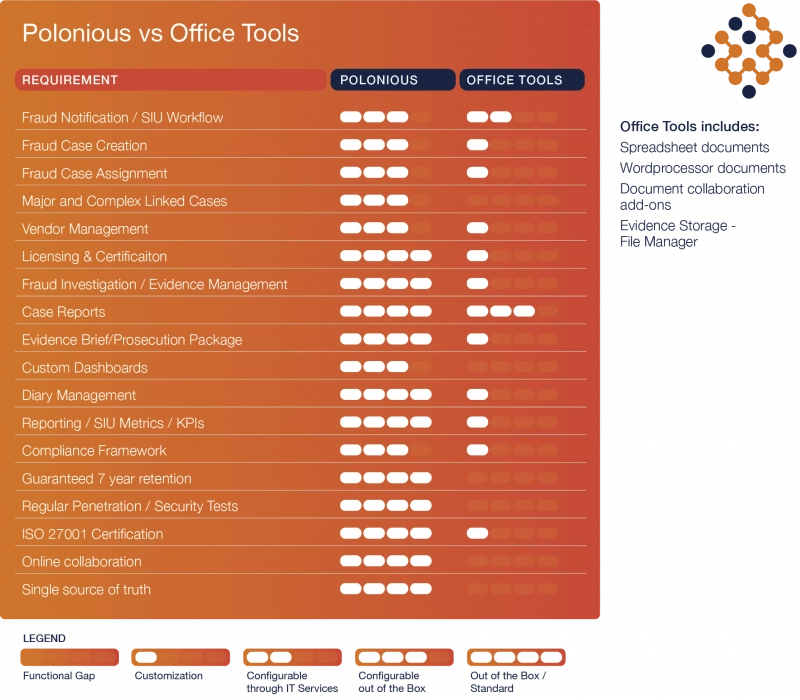In part three of this blog series, counting the benefits of dedicated investigation systems, we will look at why every day office apps like word processors and spreadsheets are not up to the task for real-world investigation teams.
Let’s take a look at the typical challenges organisations face with office tools and the steps you can take to move to a more structured and purpose-built application like Polonious.

The office approach
With office tools – either Web-based, desktop, or mobile – being readily available to most insurance professionals there is little to no barrier to using them for investigations management.
Once started, teams can easily get caught up in a complex web of documents and calculations which is neither scalable or transferable.
When it comes to doing case and investigation management with office tools, organisations are typically taking a mixed approach where different solutions are used for different parts of the process.
For example, case intake is often done via email and, although this is easier than picking up the mail in the morning, some 15 per cent of all current email is unencrypted so personally identifiable information (PII) data is potentially exposed during routine email (and document attachment) transmissions.
With email at the centre of the workflow, teams then typically tag emails in some way for future reference.
Next cab off the office rank is some form of file storage, either local or in the Cloud, which then becomes a second source of truth for the team. Then data is often stored in spreadsheets to track the case’s progress and reporting on completion.
Problems with office tools
As a cursory review of how office tools are typically used shows, there are many moving parts and siloed information sources, and this only gets worse as case and investigation complexity increases.
The main drawbacks with using office tools for investigations is there is no single source of truth. To understand what has happened, many systems need to be accessed and, adding to the problem, there is no single security framework.
Are there any benefits, or use cases, for office tools for investigations? In most cases, word processing is still a requirement, as is accounting, but they should only be used where they add value.
Once used, the documents should be converted to a more permanent format, such as a PDF and (in the case of the word document) the original destroyed. The same should be done for spreadsheet data for reporting.
Spreadsheets rarely have direct links to the source data and can easily be manipulated over time.
Don’t forget security is an ever increasing concern and using disparate solutions increases that risk across an organisation.
Going from office tools to a proper investigations system
If you have stretched the limits of what is possible with office tools and are starting to experience the fundamental problems with them, Polonious can help you move on to our dedicated case and investigations management platform.
Office tools have uses, but Polonious ensures there is a single framework that controls the workflow, security, reporting and audit requirements necessary for every investigation.
Steps you can take to “graduate” from office tools to a more structured and purpose-built application like Polonious begin with mapping out all the steps and systems you currently use; and working toward automating all, or at least the majority, of those in a single solution. You can start by clicking here to have a chat with Polonious staff about your needs.
There are also challenges and risks of office tools not keeping up with a constantly changing regulatory environment.
Office tools are terrible at ensuring compliance as they rely heavily on checklists and manually-entered dates.
Move up from disparate office tools and give your case and investigations management capability the edge with Polonious.
Let's Get Started
Interested in learning more about how Polonious can help?
Get a free consultation or demo with one of our experts
Polonious Team
Polonious is a market-leading case and investigations management application, which is designed to improve business workflow, while keeping up with the constantly changing regulatory environment.




